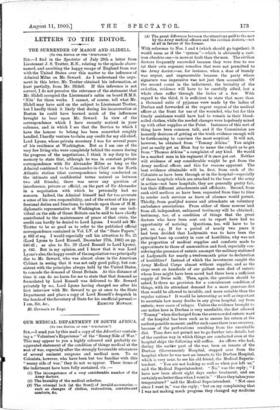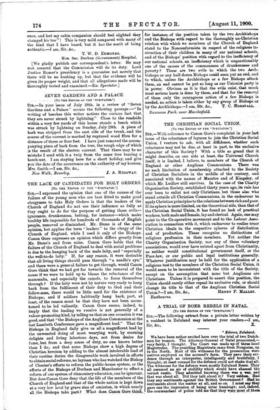OUR MEDICAL DEPARTMENT IN SOUTH AFRICA. [To THE EDITOR OP
THE "SPECTATOR.") send you by this mail a copy of the Advertiser contain- ing a "Volunteer's Experience" of the "Seamy Side of War." This may appear to you a highly coloured and probably ex- aggerated statement of the condition of things medical at the seat of war, especially after the strongly favourable utterances of several eminent surgeons and medical men. To us Colonists, however, who have been but too familiar with this "seamy side of war," they do not so appear. These items of the indictment have been fully sustained, viz. :—
(1) The incompetence of a very considerable number of the Army doctors.
(2) The brutality of the medical orderlies.
(8) The criminal lack (at the front) of invalid-accessories,- such as changes of clothes, restoratives, convalescent comforts, &a.
(4) The great difference between the attentions paid to the men by the Army medical officers and the civilian doctors,—not at all in favour of the former.
With reference to Nos. 1 and 4 (which should go together), it would seem as if the "system "—which is obviously a cast- iron obsolete one—is more at fault than the men. The civilian doctors frequently succeeded because they were free to use (at their own expense) remedies that were not permitted to the Army doctor,—as, for instance, when a dose of brandy was urgent, and unprocurable because the party whose signature was imperative was not just then accessible. Of the second count in the indictment, the brutality of the
orderlies, evidence will have to be carefully sifted, lest a whole class suffer through the laches of a few. With regard to the third, it is sufficient to state that more than a thousand suits of pyjamas were made by the ladies of
Durban and forwarded at the urgent request of the medical officer at the front for use of the wounded, who but for this timely assistance would have had to remain in their blood- soiled clothes, while the needed changes were hopelessly mixed up with other supplies at the Point. Instances of this sort of thing have been common talk, and if the Commission are honestly desirous of getting at the truth evidence enough will be forthcoming to convince the most sceptical. It will not, however, be obtained from "Tommy Atkins." You might just as easily get an Eton boy to name the culprit as to get from "Thomas Atkins" a complaint of any kind. He would be a marked man in his regiment if it once got out. Neither will evidence of any considerable weight be got from the
Army medical officer, and this for reasons apparent. The
best evidence obtainable will be, first, from such of the Colonists as have been through or in the hospital—especially of those hospitals which are attached to the base of the army in action—not base hospitals, they are generally pretty fair, but their different attachments and offshoots. Second, from such civil medicos as have been requested from time to time
to render such services as leave of absence would permit. Thirdly, from qualified nurses and attendants on voluntary
ambulance associations. From either of these sources and from all, independent, unbiassed testimony will be obtained; testimony, too, of a condition of things that the great doctors who have been sent out to report have had no
opportunity of noticing. Questions, too, will have to be put, as, e.g., If for a period of nearly two years it
had been decided that Ladysmith was to have been the principal base up country in case of hostilities, why was not the proportion of medical supplies and comforts made to approximate to those of ammunition and food, especially con- sidering the presence of enteric amongst the military stationed at Ladysmith for nearly a twelvemonth prior to declaration
of hostilities P Instead of which the investment caught the
Army Medical Corps almost without supplies, and as the siege went on hundreds of our gallant men died of enteric whose lives might have been saved had there been a sufficient supply of Swiss milk. Then, again, the question should be asked, Is there no provision for a convalescent condition of things, with its attendant demand for a more generous diet than would be allowed to invalids, and more suitable than the regular rations ? It would be interesting as well as important to ascertain how many deaths in any given hospital, say from enteric, were cases of relapse. Unless the evidence brought to our notice here in Durban is very unreliable, the diet allowed "Tommy" when discharged from the overcrowded enteric ward of the hospital has been such as to ensure his return at the earliest possible moment, and for such cases there is no recovery, because of the perforations resulting from the unsuitable diet. Time does not permit me to go further into details, but of the careless way in which things are conducted even at the hospital ships the following will suffice. An officer, who had, during the earlier part of the war, been an inmate of the Durban (Government) Hospital, stepped over from the hospital, where he was now an inmate, to the Durban Hospital, which is very near, to see his old friend, the Medical Superin- • tendent. "You are not looking so well as when you left us," said the Medical Superintendent. "No," was the reply ; "I have now been about eight days under treatment, and am
certainly no better than when I went in." "Have they taken your temperature ? " said the Medical Superintendent. "Not once since I went in," was the reply; "but on my complaining that I was not making much progreas they changed my medicine
once, and lest my cabin companion should feel slighted they changed his too" ! This is very mild compared with many of the kind that I have heard, but it has the merit of being authentic.—I am, Sir, &c.,
T. W. D. EDMONDS,
Hon. Sec. Durban (Government) Hospital.
[We gladly publish our correspondent's letter. He may rest assured that the Commission will do its duty. Lord Justice Romer's presidency is a guarantee not merely that there will be no hushing up, but that the evidence will be given its proper weight, and that all allegations made will be thoroughly tested and examined.—En. Spectator.]



































 Previous page
Previous page